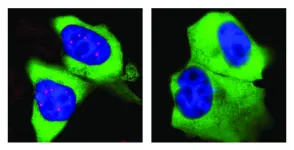(Press-News.org) WOODS HOLE, Mass. -- It's cold in the depths of the world's oceans; most of the seafloor is at a chilly 4°C. Not so the seafloor of Guaymas Basin in the Gulf of California. Here, tectonic plates drift apart and heat from Earth's interior can rise up -- so far up that it bakes large areas of the seafloor sediments, turning buried organic matter into methane and other energy-rich compounds.
What kinds of organisms thrive in this oceanic hotspot? In two new studies, MBL Assistant Scientist END
Some seafloor microbes can take the heat: And here's what they eat
2021-06-22
ELSE PRESS RELEASES FROM THIS DATE:
Investigating a better treatment sequence for esophageal cancer
2021-06-22
Looking for better ways to treat patients with esophageal cancer, University of Colorado Cancer Center member Martin McCarter, MD, is investigating whether a new treatment sequence will result in better outcomes.
As they await the results of a group of clinical trials -- including one at the CU Cancer Center -- McCarter and other University of Colorado researchers (led by surgery resident Bobby Torphy, MD, PhD) looked at data from the National Cancer Database to see if they could identify other patients who have undergone the new sequence, and what the outcomes for those patients were. The group published a paper in the Annals of Surgical Oncology in April ...
Marine sediments explain how part of Brazil's Northeast region became semi-arid
2021-06-22
Rainfall associated with the Intertropical Convergence Zone (ITCZ), the belt of converging trade winds and rising air that encircles the Earth near the Equator, affects the food and water security of approximately 1 billion people worldwide. They include about 11% of the Brazilian population, concentrated in four states of the Northeast region - Rio Grande do Norte, Ceará, Piauí, and Maranhão. Large swathes of these states have a semi-arid climate, and about half of all their annual rainfall occurs in only two months (March and April), when the tropical rain belt reaches its southernmost position, over the north of the Northeast region. During the rest of the year, the tropical ...
Switching from Western diet to a balanced diet may reduce skin, joint inflammation
2021-06-22
(SACRAMENTO, Calif.) -- The secret to healthier skin and joints may reside in gut microorganisms. A study led by UC Davis Health researchers has found that a diet rich in sugar and fat leads to an imbalance in the gut's microbial culture and may contribute to inflammatory skin diseases such as psoriasis. ...
New study: Eating prunes daily improves risk factors for heart disease and inflammation
2021-06-22
New research published in the Journal of Medicinal Food suggests eating prunes each day can improve risk factors for cardiovascular disease (CVD) including raising antioxidant capacity and reducing inflammation among healthy, postmenopausal women.
Cardiovascular disease is the number one cause of death worldwide posing a significant public health challenge.
The research led by San Diego State University reveals that prunes can positively affect heart disease risk.
"When you look at our prior research and the research of others combined with this new data, you'll see consistent ...
Experts highlight solutions to bolster long-term care workforce
2021-06-22
"Workforce issues are the most significant challenges facing the long-term care industry," states the opening editorial of a new special issue of The Gerontologist titled " END ...
Flash mob in the nucleus
2021-06-22
Almost all cells in our body contain a nucleus: a somewhat spherical structure that is separated from the rest of the cell by a membrane. Each nucleus contains all the genetic information of the human being. So it serves as a kind of library - but one with strict requirements: If the cell needs the building instructions for a protein, it won't simply borrow the original information. Instead, a transcript of it is made in the nucleus.
The machinery required for this is very complex, not least because the transcripts are not simple copies. In addition to essential information, genes also contain numerous passages of meaningless "garbage". They are removed when the transcript is made. Biologists call this editorial revision ...
In many cases, MS starts long before the diagnosis
2021-06-22
Persons suffering from the autoimmune disease multiple sclerosis can develop various neurological symptoms caused by damage to the nervous system. Especially in early stages, these may include sensory dysfunction such as numbness or visual disturbances. In most patients, MS starts with recurring episodes of neurological disability, called relapses or demyelinating events. These clinical events are followed by a partial or complete remission. Especially in the beginning, the symptoms vary widely, so that it is often difficult even for experienced doctors to interpret them correctly to arrive at a diagnosis of MS.
Above-average numbers of medical appointments
It has been evident for some ...
Researchers find signs of inflammation in brains of people who died of COVID-19
2021-06-22
The most comprehensive molecular study to date of the brains of people who died of COVID-19 turned up unmistakable signs of inflammation and impaired brain circuits.
Investigators at the Stanford School of Medicine and Saarland University in Germany report that what they saw looks a lot like what's observed in the brains of people who died of neurodegenerative conditions such as Alzheimer's disease and Parkinson's disease.
The findings may help explain why many COVID-19 patients report neurological problems. These complaints increase with the severity of infection with SARS-CoV-2, the virus that causes COVID-19. And they can persist as an aspect of "long COVID," a long-lasting disorder that sometimes ...
Antelope's fate shrouded by social, political forces
2021-06-22
If only it were as simple as finding more grassland for an antelope.
The story of efforts to conserve the endangered oribi in South Africa represent a diaspora of issues as varied as the people who live there. On its surface, like many threatened species, you have conflict between a need for habitat and private landownership.
But dig a little deeper and you'll uncover a seedy underbelly of political corruption, gambling, struggles over land, and racial tensions. No matter how much success is made through more traditional conservation efforts, says a new study by a University of Georgia researcher, the species ...
New diagnostic method may predict relapse risk for recovering prescription opioid addicts
2021-06-22
Rutgers scientists have used a diagnostic technique for the first time in the opioid addiction field that they believe has the potential to determine which opioid-addicted patients are more likely to relapse.
Using an algorithm that looks for patterns in brain structure and functional connectivity, researchers were able to distinguish prescription opioid users from healthy participants. If treatment is successful, their brains will resemble the brain of someone not addicted to opioids.
"People can say one thing, but brain patterns do not lie," said Suchismita Ray, lead researcher and an associate professor in the Department of Health Informatics at Rutgers School of Health Professions. "The brain patterns that ...



